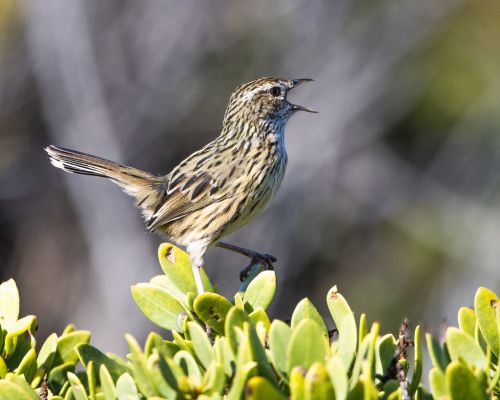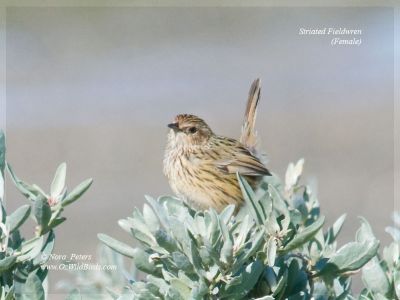Alternative name: Striated Calamanthus
- Calamanthus fuliginosus
Identification
14 cm. Tawny-olive upperparts, paler below, and streaked with black all over. Cocked tail with whitish tip. The male is distinguished by having white eye-brows, lores and throat. These are shades of brown on the female.
Distribution
South-eastern New South Wales, southern Victoria, the south-east of South Australia and Tasmania.
Taxonomy
Subspecies
There are 3 subspecies[1]:
- C. f. albiloris:
- South-east South Australia (south eastern New South Wales and south eastern Victoria)
- C. f. bourneorum:
- Southern Australia (south eastern South Australia and south western Victoria)
- C. f. diemenensis:
- Western Tasmania
- C. f. fuliginosus:
- Eastern Tasmania
Habitat
Coastal heaths and tussock fields.
Behaviour
Diet
It forages through the undergrowth and over the ground and the diet includes insects and seeds.
Breeding
It breeds between August and December when it builds a dome-like nest from coarse grasses and other fibres, lined with softer grasses feathers and down, which is hidden on the ground under tussocks or shrubs. 3-4 eggs are laid.
References
- Clements, J. F., T. S. Schulenberg, M. J. Iliff, S. M. Billerman, T. A. Fredericks, B. L. Sullivan, and C. L. Wood. 2019. The eBird/Clements Checklist of Birds of the World: v2019. Downloaded from http://www.birds.cornell.edu/clementschecklist/download/
Recommended Citation
- BirdForum Opus contributors. (2024) Striated Fieldwren. In: BirdForum, the forum for wild birds and birding. Retrieved 28 April 2024 from https://www.birdforum.net/opus/Striated_Fieldwren
External Links
GSearch checked for 2020 platform.1





